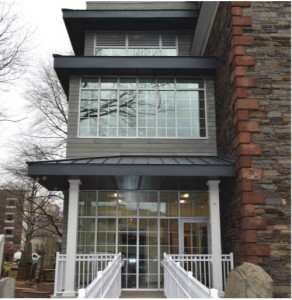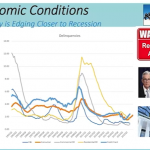New Jersey Future Blog
Forum Roundup: Finding the Opportunities in Affordable Housing
March 23rd, 2016 by Elaine Clisham

An example of adaptive reuse for affordable housing: Dina’s Dwellings, built into a historic church building in New Brunswick, will serve survivors of domestic violence. Bergen County’s United Way is building the project.
Speakers at the Redevelopment Forum’s session on how municipalities can begin to address their affordable-housing obligations even in the absence of clear guidance from the state all emphasized one key point: There is great opportunity in affordable housing.
Moderator Tom Toronto (presentation) from Bergen County’s United Way (full list of affordable-housing projects in New Jersey), which also runs New Jersey’s 211 Helpline, noted that for the past eight years, the most frequent type of call that comes into the helpline is about financial distress, usually prompted at least in part by high housing costs. The need for affordable and supportive housing is critical, he said.
Both he and Betsy McKenzie, a planner and housing special court master for many New Jersey towns, urged municipalities to be proactive in determining where and what kind of affordable housing they most want, rather than waiting for requirements to be imposed upon them. The Fair Share Housing Center, McKenzie said, is “aggressively willing to sit down and settle” with municipalities on what their affordable-housing obligation should be, thus helping to alleviate the fear towns have had of risking legal consequences of any actions, and providing a framework for other towns to follow in determining their own obligations.
Redevelopment Will be the Way Forward
McKenzie and Lara Schwager from affordable-housing developer Ingerman (presentation) emphasized that the days when large-scale greenfield development and 100-percent affordable projects using federal tax credits could help generate sufficient affordable housing are all but over, given the small amount of unregulated open land left in New Jersey and the lack of water and sewer infrastructure available in many of those places. Rather, they said, redevelopment will be the way to add affordable units going forward. Every town has older buildings, McKenzie said, and can find opportunities for infill development and adaptive re-use of existing structures.
Densities will probably be higher than many towns will want, she continued, but higher densities can bring their own benefits — help in revitalizing a downtown, for example, or providing a larger base to support transit service. Different zoning may be required, but accommodating higher densities and more affordable units can help a town achieve its other planning goals.
The First Rung on the ‘Housing Ladder’
Former Raritan Township Mayor Craig O’Brien cited the big employers in Raritan Township — a hospital, a complex of car dealerships and a juice processing plant — as being key to the township’s economy, and then noted that there are very few homes in the area that their lower-paid employees can afford. In addition, he said, college-age children of township residents to illustrate the absence of a “housing ladder” — apartments to townhomes to single-family homes — that would keep these children in the township, near their families.
All the speakers acknowledged the institutional bias among both residents and elected officials against the idea of affordable housing, despite the evident need. But all of them also showed that affordable housing can be designed to fit well into the existing built environment, can strengthen a community and help it implement its larger planning vision and goals, and can help provide young adults, local employees, residents with special needs, and empty-nesters with housing appropriate to each of their needs. Once residents begin to understand that, they said, resistance usually drops.
Additional resources on affordable housing, in New Jersey and nationwide
















